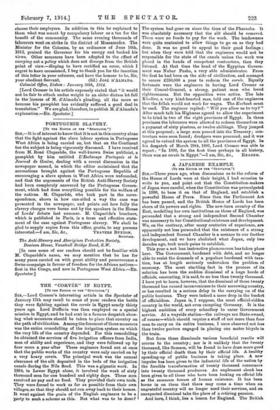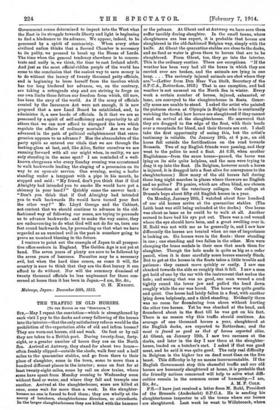A JAPANESE EXAMPLE.
;To vas ED1703 or ran ''Sracreroa.1 SIR,—Three years ago, when discussions as to the reform of the House of Lords were at their height, I had occasion to write to you, and point out that the Constitution-makers of Japan were careful, when the Constitution was promulgated in 1890, to base it on that of England, and establish a powerful House of Peers. Since then the Parliament Act has been passed, and the British House of Lords has been shorn of its powers and rights. The new-bom country of the East, modelling her own institutions on those of England, was persuaded that a strong and independent Second Chamber was necessary to her Constitutional existence and development. We, on the contrary, after many centuries of experience, are apparently not less persuaded that the existence of a strong and independent Second Chamber is a menace to our further development, and we have abolished what Japan, only two decades ago, took much pains to establish.
This year a not less instructive phenomenon has taken place here. The Government, burdened with debt, and no longer able to resist the demands of a populace burdened with taxa- tion, has at length seriously undertaken the problem of economy. The most startling fact in the process of its solution has been the sudden dismissal of a huge horde of officials, amounting, it is said, to no less than twenty thousand. I have yet to learn, however, that the dismissal of these twenty thousand has caused inconvenience to their sorrowing country. or has resulted in a serious delay in the carrying on of the public business. They were indeed a mere drop in the bucket of officialdom. Japan is, I suppose, the most official-ridden country in the world, not even excepting Germany. It is the highest ambition of every schoolboy to enter Government service. At a wayside station—the railways are State-owned, of course—which should require a staff of not more than four men to carry on its entire business, I once observed not less than twelve porters engaged in placing one motor bicycle in the train.
But from these dismissals various beneficial results will accrue to the country ; nor is it unlikely that the twenty thousand, like Samson, will be found to have done more good by their official death than by their official life. A healthy speeding-up of public business is taking place. A new impulse has been given to the industrial life of the nation by the forcible transformation of twenty thousand consumer. into twenty thousand producers. An unpleasant shock has been given to all those who have been looking on official life as the summum bonum of human existence. It has been borne in on them that there may come a time when an ungrateful country will no longer used their services, and an unexpected dismissal take the place of a retiring pension.
And here, I think, lies a lesson for England. The British Government seems determined to import into the West what the East in its struggle towards liberty and light is beginning to find a hindrance to its advance. We appear, indeed, to be possessed by a spirit of contrariety. When every other civilized nation thinks that a Second Chamber is necessary to ite polity, we proceed to break up the House of Lords. The time when the general tendency elsewhere is to concen- trate and unify is, we think, the time to east Ireland adrift. And just as the most official-ridden people of the world has come to the conclusion that the easiest way to save money is to do without the luxury of twenty thousand petty officials, and is beginning to loose herself from the incubus which has too long hindered her advance, we, on the contrary, are taking a retrograde step and are striving to forge on our own limbs those fetters our freedom from which, till now, has been the envy of the world. As if the army of officials created by the Insurance Act were not enough, it is now proposed that a new Land Board be established, and, to administer it, a new horde of officials. Is it that we are so possessed by a spirit of self-sufficiency and superiority to all others that we can now afford to disregard the laws which regulate the affairs of ordinary mortals P Are we so far advanced in the path of political enlightenment that retro- gression appears to ne advance P Has the abracadabra of the party spirit so entered our vitals that we are through the looking-glass at last, and, like Alice, flatter ourselves we are running forward with all our might when, in reality, we are only standing in the same spot P I am reminded of a well- known clergyman who every Sunday evening was accustomed to walk backwards leading the singing of a procession on its way to an open-air service. One evening, Freeing a loafer standing under a lamppost with a pipe in his mouth, he stopped and said: "My friend, don't you think that if God Almighty bad intended you to smoke He would have put a chimney in your head Quickly came the answer back : "Don't you think that if God Almighty bad intended you to walk backwards He would have turned your feet the other way?" Mr. Lloyd George and the Cabinet, not content that we should continue to advance in the old- fashioned way of following our noses, are trying to persuade us to advance backwards and to make the way easier, they are endeavouring to do what God will not do for ne, turn our feet round backwards too, by persuading us that what we have regarded as an unmixed evil in the past is somehow going to prove an unmixed blessing in the future.
I venture to point out the example of Japan to all prospec- tive office-seekers in England. The Golden Age is not yet at hand. The seven years of plenty are sure to be followed by the seven years of leanness. Parasites may be a necessary evil, but when the hard time comes, as come it will, the country is sure to think that they are the first luxury it can afford to do without. Nor will the summary dismissal of twenty thousand officials be less unpleasant for those con- cerned at home than it has been in Japan.--I am, Sir, &c.,











































 Previous page
Previous page